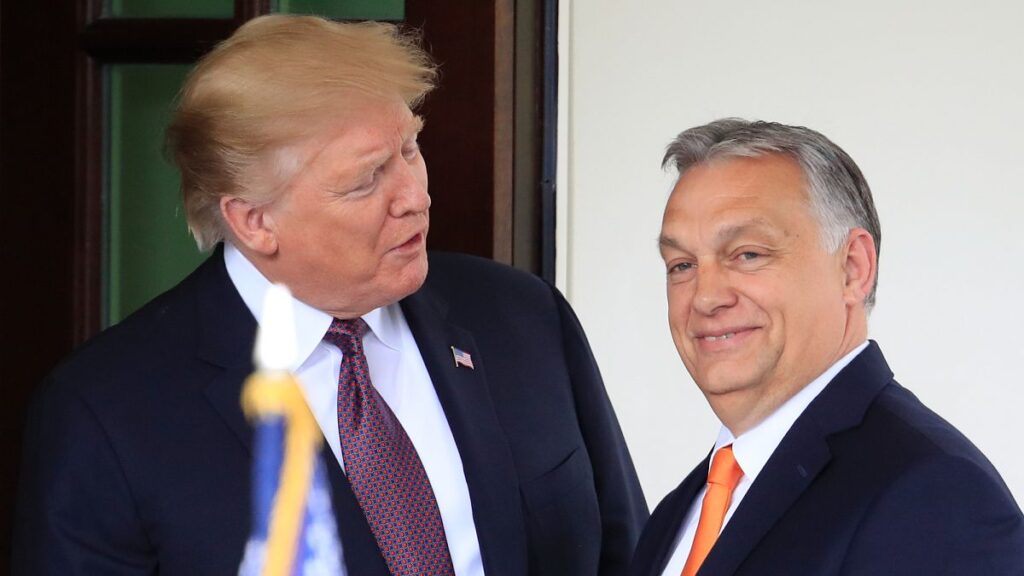Hungary is under increased pressure from the US and from the EU to phase out Russian fossil fuels, but Budapest is standing its ground, while the EU offers financial help for the transition.
On Wednesday Hungarian Foreign Minister Péter Szijjártó rejected the calls from Donald Trump asking Hungary to phase out Russian oil imports.
“We, of course, support all of President Donald Trump’s efforts for peace. However, our geographical location creates a reality, and we cannot change this reality,” he emphasized in New York, where he’s attending the UN General Assembly.
Szijjártó added that his country imports only 2% of Russia’s oil exports and said existing alternative routes from Croatia are not sufficient to replace this.
Last week, US President Donald Trump called on NATO members to stop Russian oil imports to press Moscow for a peace agreement. And at the UN General Assembly, he had a personal message to Hungary’s right-wing Prime Minister, Viktor Orbán.
“He is a friend of mine. I have not spoken to him, but I have a feeling that if I did, he might stop. And I think I’ll be doing that,” Trump said.
Orbán is a staunch supporter of Trump, and was the only European politician who openly campaigned for his re-election. Orbán also maintains close ties with Russian President Vladimir Putin, however, and Hungary has favourable contracts for the purchase of Russian oil and gas.
A potentially risky situation for Hungary
A potentially risky situation for Hungary
Hungarian Foreign Minister Péter Szijjártó argued against the decoupling, saying that alternative routes, like the Adria pipeline through Croatia, are not sufficient to replace the Drushba oil pipeline, the main route of Russian oil to Hungary and Slovakia.
“Tests have clearly proven in recent weeks that this pipeline, in its current technical condition, is incapable of transporting large quantities of oil continuously, at high pressure,” Szijjártó said on Wednesday.
Citing an IMF report, Hungary’s international spokesperson, Zoltán Kovács, said on Wednesday that Hungary’s GDP would shrink by more than 4% if Russian gas supplies were cut off EU-wide.
Talking to Euronews, Hungary’s Ministerial Commissioner for direct EU Funds, Bernadett Petri, admitted that the international tensions around Hungary’s fossil fuel imports is a potential risk for the country.
“Obviously, Hungary could be the loser in the energy-related give-and-take that is currently taking place on the global stage, but I think it will do everything to avoid that,” Bernadett Petri said.
Lately, Russian oil supplies to Hungary and Slovakia have stopped for days, after Ukraine bombed the Druzhba pipeline on Russian territory.
The EU could step in to support the transition
Eamon Drumm, a research analyst at the German Marshall Fund of the United States, previously told Euronews that Hungary and Slovakia will be squeezed to drop Russian fossil fuels, but both countries might apply for EU funding to do this.
“If this were to have an impact on Hungary, it would be through extracting more support from the EU for diversification efforts because the replacement of Russian oil and gas to a lesser extent, is costly, adds complexity, and there are challenges with the infrastructure as well,” Eamon Drumm said.
Asked by Euronews, a European Commission spokesperson said the executive will work together with Hungary and Slovakia on the issue of decoupling from Russian oil.
“We continue to work intensely with them to ensure a smooth diversification, smooth transition, and to help them find alternative supplies,” Anna-Kaisa Itkonen said, adding: “We obviously understand the concerns that have been raised both by Slovakia and Hungary in this context. And the work continues. We have set up various kinds of formats at the technical level, at the political level, to stay in touch and to take this work further.”
The Hungarian government did not comment on the talks with the Commission.
The Commission previously presented an ambitious roadmap to eliminate all purchases of Russian fossil fuels by the end of 2027 at the latest.
But amid heavy pressure from Donald Trump, who has urged Europeans to cut all energy ties with Moscow, Brussels has taken a step to speed things up in a new sanctions package, which, if approved, will bring the end of Russian LNG one year earlier to 1 January 2027.
Read the full article here

